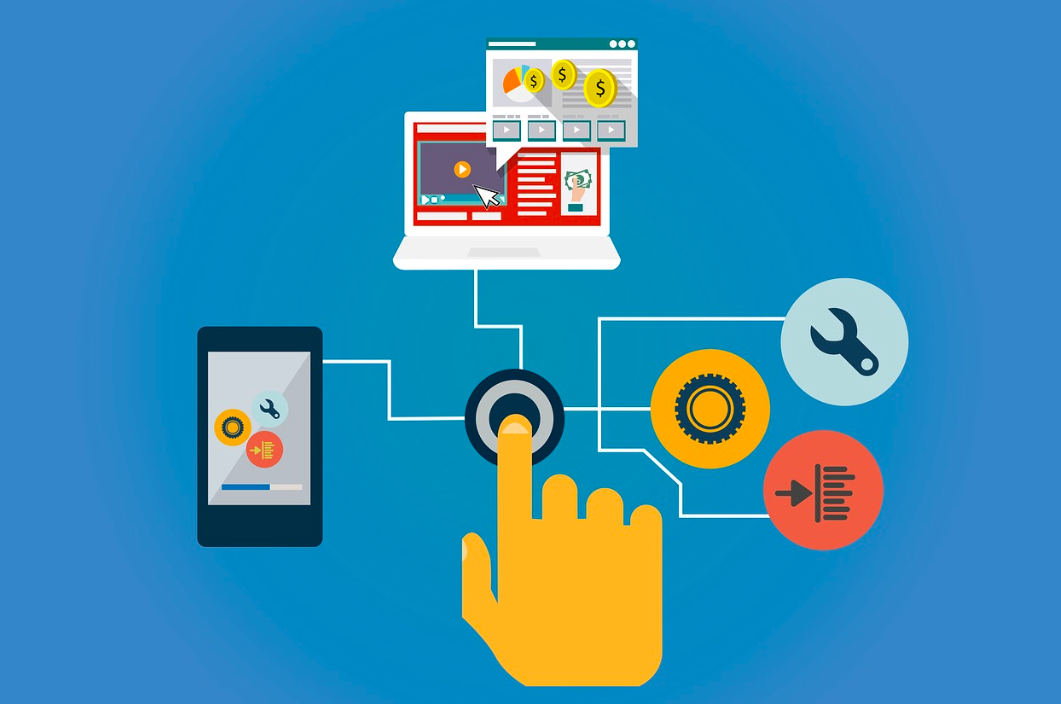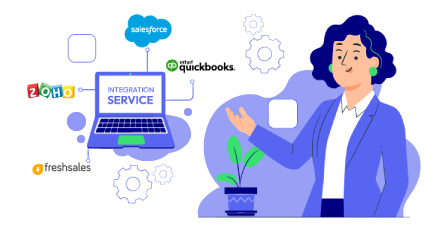10 Ecommerce Integration Software Boosting Your Online Store

Running a business is like navigating a challenging obstacle course, especially with the added difficulties brought by the pandemic. To thrive, it’s crucial to streamline and enhance your online store.
A valuable approach is to make sure you’re using top-tier ecommerce software that seamlessly integrates. This minimizes the time spent dealing with third-party integration issues on your ecommerce platform, allowing you to focus on more critical tasks. Integrations are pivotal in optimizing your ecommerce setup.
Every ecommerce store relies on a stack of essential applications, such as sales and ecommerce marketing automation, CRM, accounting, point-of-sale systems, order tracking, and inventory management software. The ideal scenario is for these applications to work harmoniously, simplifying complex processes, providing comprehensive business insights, and reducing time spent in third-party tools.
Many ecommerce integration software employs APIs (application programming interfaces) to link various software applications. These integrations enable smooth communication and data exchange among your systems via your ecommerce platform. Customer-centric companies like Emotive prioritize integrations based on the most in-demand apps that offer significant value to the majority of merchants.
What is eCommerce Integration?
Ecommerce integration entails linking your eCommerce platform to backend systems through Ecommerce Connectors, facilitating centralized management of inventory, customer data, orders, and shipping. This streamlining enhances overall business efficiency, leading to an improved customer experience.
Think about the crucial apps and tools for your eCommerce store—POS system, marketing tools, inventory database, and logistics platforms. Modern ecommerce relies on various tools from different vendors, posing challenges in connection. This leads to inefficiencies, complexities, and dispersed customer data, impacting visibility, marketing, and customer service.
Why Is Ecommerce Integration Important?
Understanding the technical definition of integration is just the beginning; its benefits may not be immediately apparent. To shed light on why ecommerce integration is crucial for your business growth, consider the following ways it provides valuable support.
Improved Visibility
As you embark on the utilization of an expanding array of tools and services to bolster the growth of your ecommerce venture, you’ll quickly realize that a substantial portion of your customer data is dispersed across diverse systems, vendors, and platforms.
Take, for example, your CRM system, housing detailed information that can enhance the personalization of your marketing campaigns. However, the user experience can be elevated further by integrating your CRM with other backend systems, such as your order management software. Through this integration, you gain the capability to view past orders when segmenting customers for marketing lists or investing in direct advertising.
Integration can extend to linking your Enterprise Resource Planning (ERP) solution with the entirety of your systems. The restoration of visibility stands out as a primary rationale for the significance of ecommerce integration. With a seamlessly integrated ERP system, redundancy in business processes can be eradicated, and workflows can be streamlined to mitigate human error, save time, and ensure your team effectively meets key business requirements.
Support for Data Governance
The detrimental impact of siloed data on business is widely recognized. Integration not only provides visibility into the location of data but also facilitates the swift movement, control, and protection of data across diverse systems. This capability proves instrumental in dismantling data siloes, aligning with a pivotal business objective: governance.
Even for industries not bound by stringent regulations such as HIPAA in healthcare, the landscape of privacy standards and compliance regulations is progressively becoming more stringent. Consequently, the paramount importance of data governance in the realm of business, especially in the context of e-commerce, is underscored.
E-commerce integration emerges as a crucial component in supporting a robust data governance strategy. This, in turn, contributes to the enforcement of data privacy, compliance adherence, and quality control. By safeguarding personal information, businesses not only earn the gratitude of their customers but also enhance transparency regarding the collection, storage, and utilization of data.
Informed Business Intelligence
The heightened visibility and control over data, facilitated by integration platforms, play a pivotal role in supporting business intelligence (BI) initiatives. An exemplary illustration is found in the capabilities of integrate.io, which effectively manages data through advanced Extract, Transform, and Load (ETL) and reverse ETL processes.
These tools, executing operations of extraction, transformation, and loading, empower businesses to discover, manipulate, and disseminate data across various systems. An integration platform like integrate.io serves as a conduit to seamlessly connect with a business intelligence dashboard. This integration empowers businesses to extract real-time insights directly from the existing pool of data, thereby unlocking valuable intelligence.
How the best integration software for ecommerce benefits your online store

Key Features of Best Ecommerce Integrations to Look for
- Seamless Connection: Top-tier ecommerce integrations establish seamless connections between your crucial software applications.
- Enhanced User Experience: They create a hassle-free front-end experience for both shoppers and customers.
- Low Maintenance: Integrations simplify the backend operations, resulting in a lower maintenance burden for you as a business owner.
- Sales and Satisfaction: These ecommerce integration software has the potential to boost sales and increase customer satisfaction.
- Efficient System Management: They provide an easier way to manage multiple systems efficiently.
- Accurate Insights: Integrations offer precise insights into the functionality and performance of your online store.
Benefits of Best Ecommerce Integrations
Remove manual and replicated data
Integration centralizes data, ensuring accurate customer and product information in ecommerce systems. This minimizes manual tasks, addressing challenges like integration difficulties and the risk of data issues.
Manual entry is time-consuming, hindering the development and testing of multiple integrations for shopping platforms. Without built-in integration, routine updates become challenging, potentially driving away customers seeking efficient alternatives.
Save time and increase productivity
Ecommerce integration streamlines daily processes, automating tasks such as customer notifications and accelerating data exchange between systems. This efficiency extends to seamless updates to the overall system and real-time inventory management.
By eliminating the need to sift through duplicates, businesses can stay focused on their core activities – delivering competitive products or services.
Focus on strategic tasks
By automating routine tasks, integrations free up your time, allowing you to concentrate on more critical aspects of your business.
Visibility into business health
Integrations provide visibility into the overall health of your business, aiding in informed decision-making.
Support for growth business
Growth goes beyond expansion and new clients; it includes nurturing existing relationships. Satisfied customers are likely to refer your business, emphasizing the enduring impact of word-of-mouth.
Ecommerce integration is crucial post-COVID-19, ensuring business agility in the digital landscape, where online operations continue to dominate due to lockdowns and social distancing.
Ensure data integrity and accuracy
Accurate information empowers decision-making, preventing costly errors. Having precise data enables businesses to identify market trends, stay competitive, and avoid obsolescence. Accuracy in pricing and inventory fosters customer loyalty, reducing the likelihood of customers seeking alternatives.
Improve customer experience
Smart businesses understand the mutual need with their clients, moving beyond the “customer is king” approach. Ecommerce integration ensures transparent processes, simplifying customer experiences and expanding sales options.
It also optimizes resource allocation, providing better services, and allows businesses to swiftly adapt to market changes, staying competitive. In essence, it’s a win-win for both businesses and clients.
The 10 best ecommerce integration solutions for your ecommerce business
We’ve collaborated with over a thousand merchants and businesses, observing the ecommerce platforms, software, and integrations they employ to bolster their online stores. Below, we present 10 crucial ecommerce integration software that all online businesses should contemplate.
1. Website builder
The effectiveness of any ecommerce website hinges on its underlying system. The cornerstone for most of your ecommerce integration software lies in the platform you select to manage your online store. A website builder, such as Wix, Squarespace, or Weebly, equips you with a toolkit to construct a website tailored to your products and customer base.
Certain website builders, like Shopify, WooCommerce, or BigCommerce, go a step further by specializing in online selling and offering ecommerce features like membership portals, online databases, social sharing capabilities, and mobile-friendly templates. It’s important to note that all website builders should provide integrations with essential applications because they recognize that you’re not merely building and operating a store but also marketing it and synchronizing its data with other systems.
2. Email marketing solution
Chances are, you’re among the four billion individuals worldwide who utilize email. Email has long served as the cornerstone for both inbound and outbound sales and marketing efforts. It’s how many businesses uniquely identify their customers, and email stands as the primary communication channel for order confirmations, promotions, discount codes, and updates about store offerings or changes. It’s the most widely used form of marketing automation for both B2B and B2C ecommerce enterprises.
Implementing this kind of ecommerce integration software on your website can assist in gathering the email addresses of casual visitors, enabling you to follow up with them and encourage them to become customers. Integrating your email marketing solution allows you to target specific customer segments based on their behavior. Popular email marketing platforms include MailChimp, Klaviyo, Campaign Monitor, and Constant Contact. When integrated with ecommerce platforms like WooCommerce, Magento, Shopify, or BigCommerce, these programs enable merchants to centralize and monitor their customer data in one location.
3. SMS marketing solution

Text marketing has emerged as a highly effective ecommerce integration software for expanding online businesses. One key factor driving the rise of SMS marketing is the increasing number of customers who shop directly from their mobile devices. Mobile phones now contribute to over 65% of all ecommerce traffic, with more than half of online sales originating from mobile devices.
Customers desire the ability to search, browse, sign up for text messages, receive offer codes via text, add items to their cart, and complete purchases—all from their mobile phones and within minutes. In a competitive marketplace where speed and convenience are highly valued by shoppers, ecommerce text message marketing can grab their attention and maintain it.
Moreover, text messages boost significantly higher open rates (98%) compared to email messages (20%) on average. Thus, it’s crucial to integrate your email marketing efforts with text marketing. This approach allows you to engage with customers across the platforms they frequent, track the messages and campaigns that resonate most with them, and leverage this customer data to enhance your marketing return on investment (ROI).
4. Shipping and fulfillment software
As your ecommerce business expands, the shipping process becomes pivotal in determining your success or downfall. For instance, if you’re selling high-value jewelry items, shipping and delivery issues, such as inaccurate addresses or delays, can pose significant risks. Ensuring quick, reliable, and secure delivery of customers’ purchases becomes your responsibility.
With expedited shipping services like Amazon Prime becoming the norm, customers now anticipate swift shipping that’s either free or discounted. Unexpected shipping fees during the checkout process can lead to cart abandonment, a common challenge faced by many online stores.
Integrations with shipping and fulfillment software can automate and streamline the often monotonous tasks associated with shipping. These tasks include comparing shipping rates from various providers, generating labels and packing slips, and tracking shipments. Shipping ecommerce integration software mitigates the risk of manual errors and enables you to offer your customers shipping options that best suit their preferences.
5. Payment gateway
A web-based payment system serves as the backbone of your online sales. Acting as the final step in the checkout process, a payment gateway securely and swiftly verifies the credit card and banking details exchanged between you and your customers. Nowadays, customers anticipate a range of payment options on your website, whether it’s Visa and Mastercard or PayPal and Klarna.
Merchants also have choices. You can opt for a redirect payment processor, directing your customers to the payment processor’s website to input their credit card details before returning to your store upon completion. Alternatively, you can integrate an on-site payment gateway, keeping customers on your server for entering payment information. This option provides merchants with greater control over the payment experience but requires having your own point-of-sale system.
6. Inventory management

Efficiently running your business necessitates tracking orders and managing inventory from a single centralized platform. This provides both you and your customers with up-to-the-minute information on available stock. It’s crucial to be aware of when it’s time to reorder inventory and when you can notify customers that a desired item is back in stock. By integrating with an inventory management system, you gain real-time visibility into your products and can synchronize data across multiple stores or systems as needed.
Integrating with inventory management software empowers you to monitor items sold, recognize restocking requirements, and identify your most popular products. This ecommerce integration software also plays a pivotal role in preventing lost sales and establishing a healthy balance between supply and demand.
7. Social media management tool
To effectively connect with your customers, it’s essential to have a presence on social media. A significant majority of Americans, roughly two-thirds, engage with social media platforms daily, making them an ideal space for your business to engage, communicate, influence buying decisions, and provide solutions to customer queries.
Integrating your social media management software with your other marketing and ecommerce tools offers an efficient way to automate communications, save time, and maintain consistent brand messaging. For businesses with a higher volume, considering the assistance of an ecommerce agency might be worthwhile. You can also integrate engagement data from your social media tools into your analytics dashboard, allowing you to track the volume and type of traffic driven to your store by social media.
Furthermore, social media can act as a customer support proxy, as it’s often faster and more convenient to address customer questions or comments on platforms like Twitter than through email or chatbots.
8. CRM management
Customer Relationship Management (CRM) is an ecommerce integration software that is designed to enhance your understanding of your customers by leveraging their data, ultimately strengthening your customer relationships. These systems enable you to monitor your customers’ personal details and interactions. This data serves as a valuable resource for targeting customers based on their past actions, recognizing trends, and fostering customer loyalty.
When your CRM system integrates seamlessly with your marketing tools, ordering system, and analytics applications, it provides a comprehensive view of your customers. This includes their demographics, shopping behaviors, and average order value (AOV). By harnessing your CRM tool to gain deeper insights into your customers, you can utilize it to tailor personalized offers, boost sales, and cultivate loyalty.
Get Seamless Magento Integration Today!
9. Customer support software
Customer satisfaction is the key to retaining shoppers and ensuring their return to your store. It’s crucial to meet customers where they are and promptly address their inquiries, concerns, or complaints with well-informed responses. The most effective way to achieve this is by integrating your various customer support channels, such as live chat and help desk systems, with your ecommerce platform. This consolidation provides a centralized record of all customer interactions, enabling you to consistently deliver a high level of service.
Integrating live chat or chatbot solutions can be a cost-effective means of scaling up your customer support. Automation of common questions and responses allows you to assist numerous customers simultaneously. Additionally, ecommerce integration software with help desk systems like Zendesk enables you to document customer interactions through tickets and associate them with the customer’s account, ensuring a comprehensive view of their support history.
10. Accounting solution

Ecommerce accounting software plays a pivotal role in establishing accurate and efficient bookkeeping procedures. Given that you’re running a business, it’s essential to maintain well-organized and up-to-date financial records, as they underpin all your other operations.
This ecommerce integration software can significantly expedite your bookkeeping efforts by automating essential processes. When dealing with a multitude of individual transactions, automation also minimizes the risk of human errors.
Effective reporting and user-friendliness are fundamental aspects of any ecommerce accounting solution. You require immediate, real-time visibility into your financial data, with a customizable dashboard tailored to your business requirements. If you’re merging online and brick-and-mortar finances or managing multiple online stores, integrations become indispensable in providing a consolidated and accurate source of financial information.
Find the best ecommerce integration software to run your business
Running a successful business is undeniably hard work, but there are ways to make it more efficient and streamlined. Integrations serve as those valuable shortcuts. These connections between various software applications allow you to simplify your processes, automate tasks, synchronize critical sales data, expand your services to more customers while maintaining quality, and reduce the potential for human errors.
Regardless of the ecommerce platform you rely on, the right ecommerce integration software enables you to craft a seamless customer experience across every interaction point you have with your shoppers. This spans from managing inventory and orders to engaging with them on social media and implementing effective marketing strategies.







